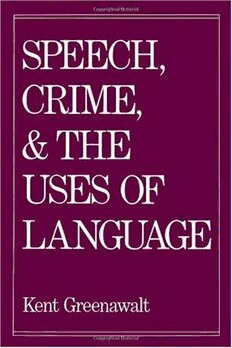Download Speech, Crime, and the Uses of Language PDF Free - Full Version
Download Speech, Crime, and the Uses of Language by Kent Greenawalt in PDF format completely FREE. No registration required, no payment needed. Get instant access to this valuable resource on PDFdrive.to!
About Speech, Crime, and the Uses of Language
In this book Greenawalt explores the three-way relationship between the idea of freedom of speech, the law of crimes, and the many uses of language. He begins by considering free speech as a political principle, and after a thorough and incisive analysis of the justifications commonly advanced for freedom of speech, looks at the kinds of communications to which the principle of free speech applies. He then turns to an examination of communications for which criminal liability is fixed. Focusing on threats and solicitations to crime, Greenawalt attempts to determine whether liability for such communications seriously conflicts with freedom of speech. In the second half of the book he goes on to develop the significance of his conclusions for American constitutional law, addressing such questions as what should be considered "speech" within the meaning of the First Amendment, and what tests the courts should employ in deciding whether particular criminal statutes should be held constitutional. He concludes that the issues are too complex to yield simple solutions, and insists that the protection of the First Amendment can be reduced neither to one justification nor to one all-purpose test of coverage.
Detailed Information
| Author: | Kent Greenawalt |
|---|---|
| Publication Year: | 1992 |
| ISBN: | 9781429407601 |
| Pages: | 360 |
| Language: | |
| File Size: | 21.194 |
| Format: | |
| Price: | FREE |
Safe & Secure Download - No registration required
Why Choose PDFdrive for Your Free Speech, Crime, and the Uses of Language Download?
- 100% Free: No hidden fees or subscriptions required for one book every day.
- No Registration: Immediate access is available without creating accounts for one book every day.
- Safe and Secure: Clean downloads without malware or viruses
- Multiple Formats: PDF, MOBI, Mpub,... optimized for all devices
- Educational Resource: Supporting knowledge sharing and learning
Frequently Asked Questions
Is it really free to download Speech, Crime, and the Uses of Language PDF?
Yes, on https://PDFdrive.to you can download Speech, Crime, and the Uses of Language by Kent Greenawalt completely free. We don't require any payment, subscription, or registration to access this PDF file. For 3 books every day.
How can I read Speech, Crime, and the Uses of Language on my mobile device?
After downloading Speech, Crime, and the Uses of Language PDF, you can open it with any PDF reader app on your phone or tablet. We recommend using Adobe Acrobat Reader, Apple Books, or Google Play Books for the best reading experience.
Is this the full version of Speech, Crime, and the Uses of Language?
Yes, this is the complete PDF version of Speech, Crime, and the Uses of Language by Kent Greenawalt. You will be able to read the entire content as in the printed version without missing any pages.
Is it legal to download Speech, Crime, and the Uses of Language PDF for free?
https://PDFdrive.to provides links to free educational resources available online. We do not store any files on our servers. Please be aware of copyright laws in your country before downloading.
The materials shared are intended for research, educational, and personal use in accordance with fair use principles.

